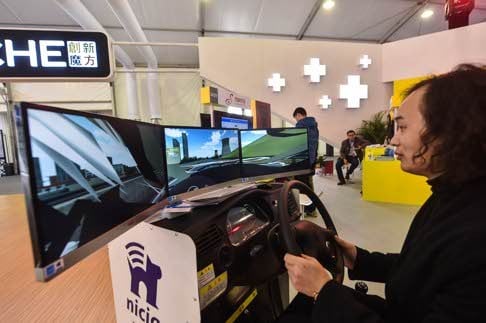
President Xi Jinping to give address on internet governance
Three-day World Internet Conference also aims to shine a spotlight on China’s “Internet Plus” strategy
President Xi Jinping will detail his views on internet governance at the second World Internet Conference (WIC) in the Zhejiang town of Wuzhen on Wednesday.
The three-day conference, opening on Wednesday, comes as both the central government and Chinese internet giants look for greater influence on the world stage in the development and security of the internet. Mainland China, with 668 million internet users, is home to the world’s biggest online population.
With the theme “An Interconnected World Shared and Governed by All – Building a Cyberspace Community of Shared Destiny”, the government-run conference will feature strategic-level discussions on global internet governance and the industry as an economic growth engine, according to the organisers.
It also aims to shine a spotlight on China’s “Internet Plus” strategy, global internet standards, local tech innovation, cybersecurity, the digital “Silk Road” and the fast-expanding worldwide e-commerce market.
Xi has outlined his main thoughts on internet governance in public recently, saying China proposes that all countries institute their own internet policies in line with their own national conditions and that it advocates the building of a peaceful, secure, open and cooperative cyber space.
The internet has been a boon to China’s economy, contributing 7 per cent of gross domestic product last year, up from 3.3 per cent in 2010, according to the China Internet Network Information Centre.
There are now 328 listed Chinese internet-concept enterprises, including 61 listed in the United States and 55 listed in Hong Kong, with their market values totalling 7.85 trillion yuan.
The country’s 13th five-year plan (2016-2020) will include the “Internet Plus” strategy, which the authorities hope will help counter the economic slowdown.
Jin Jianhang, the president of e-commerce giant Alibaba, said the conference was a great platform for countries and companies to exchange ideas. He said it would take a global effort to make a better internet, with China able to contribute significantly.

“It is a good thing that the government is encouraging internet industry and entrepreneurship. The whole society should understand and adjust to the change.
“The first 20 years of the internet was about technology and business innovation. The next 30 years are about the internet changing every aspect of society. It is just getting started.”
Marie Sun, a senior equity analyst at investment research firm MorningStar, said the Chinese internet sector, as “one of the key drivers for the ‘new economy’”, had become strategically important.
She said Communist Party general secretary Xi’s attendance at the conference illustrated the top leadership’s support for the sector, with Chinese Internet companies likely to see more government support in areas such as internet finance and the Internet Plus strategy.
The next 30 years are about the internet changing every aspect of society
Top executives from Chinese internet giants Alibaba, Tencent, Baidu, Xiaomi, JD.com, Sohu and Sina are all scheduled to attend the event, while those from major global internet and information technology firms such as Apple, Amazon, Google, Facebook and Microsoft are missing from the guest list released by the conference’s organiser.
Many reporters from overseas media outlets will not be able to attend the event, having been told media registration closed in September. Wuzhen will also be off limits to regular tourists for the duration of the conference.
While internet giants such as Facebook, Google and Twitter are banned from mainland China, domestic tech companies now boast stock-market valuations that rival their foreign counterparts, in part because certain Western companies cannot operate in the enormously profitable mainland market. Some Chinese online platforms, like messaging service WeChat or online shopping network Taobao, also feature more user-friendly and efficient interfaces than their overseas competitors.
“Compared to Western countries, China has a less developed offline infrastructure and lower efficiency for state-owned enterprises and the government,” said Sun, citing the inefficiency as the reason Chinese internet companies like Tencent and Baidu had succeeded in the Chinese market.
Tech firms must reject the Chinese authorities’ efforts to influence global internet governance in ways that would curb freedom of expression and exacerbate human rights abuses, Amnesty International said ahead of the conference. Early this month the central government once again blocked mainland internet users from accessing Wikipedia, the world’s largest free online encyclopaedia.
Sun said the central government did not want internet content that it deemed a threat to security, or information that opposed the government, adding that increased tightening of the controls on the internet on the mainland would make it difficult for the internet sector to improve.
The event is expected to attract about 2,000 participants from 120 countries and regions, including eight foreign leaders and close to 50 ministerial-level officials.
Among them are Russian Prime Minister Dmitry Medvedev, Pakistani Prime Minister Nawaz Sharif, Kazakh Prime Minister Karim Massimov, Kyrgyz Prime Minister Temir Sariyev and Tajik Prime Minister Kokhir Rasulzoda, according to the Cyberspace Administration of China.
Hong Kong’s newly appointed Secretary for Innovation and Technology, Nicholas Yang Wei-hsiung, will also attend the conference.



